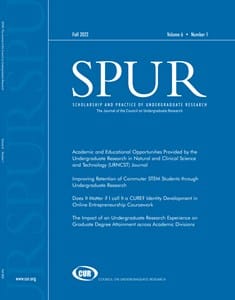SPUR (2022) 6 (1): https://doi.org/10.18833/spur/6/1/8
More Articles in this Issue
- Practice‐ Jennifer Kuan and Quentin C. Sedlacek
SPUR (2022) 6 (1): https://doi.org/10.18833/spur/6/1/7 Abstract:Course-based undergraduate research experiences (CUREs) have historically been associated with STEM, but are expanding into other fields. CUREs may benefit undergraduate business majors, but some students do not perceive “doing research” as part of business. The authors ask whether a business CURE can lead students to begin self-identifying as researchers. Particular attention is paid to explicitness: Do students report different self-identification outcomes if they are explicitly told they are doing research? Survey data are collected from a required entrepreneurship course in which an instructor explicitly talks about her research career and authentically characterizes normal course activities as “scientific research” in some course sections but not in others. Pre- and post-course surveys show statistically significant growth in student self-identification as researchers only in the “explicit CURE” sections.
- Assessment‐ Keith Brouhle and Brad Graham
SPUR (2022) 6 (1): https://doi.org/10.18833/spur/6/1/3 Abstract:Initially promoted in the sciences, undergraduate research experiences (UREs) are now common academic offerings for students across all areas of curricula. This study extends previous research by evaluating the impact of a URE along two new dimensions: on different graduate degree attainments of students PhD or master’s/professional degrees and by the academic area of the URE (in the sciences, social sciences, or humanities). These issues are investigated using a unique student record database and employing an empirical framework to address the sample selection inherent in URE evaluation. UREs are found to have a positive impact on PhD completion in the sciences and social sciences but no impact in the humanities. No evidence is found that UREs impact attainment of master’s and professional degrees.
- Practice‐ Mindy Capaldi, Kristi Bugajski, Bonnie Dahlke Goebbert, Michael Watters, and Michael Slattery
SPUR (2022) 6 (1): https://doi.org/10.18833/spur/6/1/1 Abstract:Student retention is important to any university, especially keeping commuter students who are traditionally less anchored in campus life. Even more at risk, given the leaky STEM pipeline, are STEM commuter students. In 2016, Valparaiso University launched the Establishing Practices Integrating Commuter Students (EPIC) program, centered around engaging students in undergraduate research. Students participate in a research laboratory for their four academic years, and take part in one summer of funded research. This program has achieved its goal of providing scholarships, research opportunities, and cohort support to over 30 commuter and residential students while preparing them for research-oriented careers. This article shares successes and lessons learned, along with data demonstrating the program’s impact on broadening participation in STEM and increasing retention.
- Practice‐ Neethu Pavithran, Redwan Haque, Neha Dhanvanthry, Ankush Sharma, Arjun Singh, Chun Ju Liang, Radha Sharma, Stephanie Nagy, Harrison Nelson, Soumya Shastri, Saameh A. Siddique, Vedish Soni, Chitrini Tandon, Molly H .R. Cowls, Alessandra Cutrone, Ayomide Fakuade, Varnikaa Gupta, Halton Quach, Jessica B. Saini, and Jeremy Y. Ng
SPUR (2022) 6 (1): https://doi.org/10.18833/spur/6/1/2 Abstract:The Undergraduate Research in Natural and Clinical Science and Technology (URNCST) Journal was founded in 2017 and currently serves as a leading publisher of undergraduate research spanning broad and multidisciplinary fields. Unique to most undergraduate journals, the URNCST Journal publishes abstracts for undergraduate conferences and case competitions and promotes innovative undergraduate research education initiatives. The present article summarizes the contributions, opportunities, and achievements of the journal since its inception.


